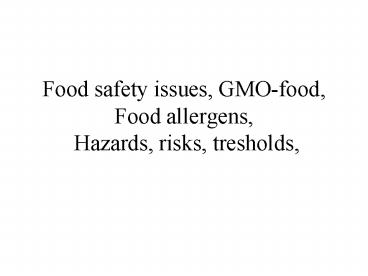Food safety issues, GMOfood, Food allergens, Hazards, risks, tresholds, - PowerPoint PPT Presentation
1 / 45
Title:
Food safety issues, GMOfood, Food allergens, Hazards, risks, tresholds,
Description:
Safety Assessment, Detection and Traceability, and ... European Network on Safety Assessment of Genetically Modified Food ... like lobsters, crab, oyster ... – PowerPoint PPT presentation
Number of Views:106
Avg rating:3.0/5.0
Title: Food safety issues, GMOfood, Food allergens, Hazards, risks, tresholds,
1
Food safety issues, GMO-food, Food allergens,
Hazards, risks, tresholds,
2
Food and Chemical ToxicologyVolume 42, Issue 7,
Pages 1043-1202 (July 2004)
- Safety Assessment, Detection and Traceability,
and Societal Aspects of Genetically Modified
Foods - European Network on Safety Assessment of
Genetically Modified Food Crops (ENTRANSFOOD) - Edited by H.A. Kuiper, G.A.Kleter, A. Konig, W.P.
Hammes, I. Knudsen
3
(No Transcript)
4
Literature data
5
(No Transcript)
6
(No Transcript)
7
(No Transcript)
8
(No Transcript)
9
(No Transcript)
10
New GM variety An integrated approach to hazard
assessment characterisation of all elements
11
(No Transcript)
12
Demonstration of unintended effects by phenotype
selection or investigation of defined
constituents
13
Assesment by omics- based analyses
Joung J.Nutr 2001, Oliver Nature 2000, Go J.
Nutr 2003
14
Plant protein 2-D databases
15
Example Automated data-analysis
(metabolite-profiling)
16
3H NMR spectra of tomatoes, signals of a
selection of metabolites
17
Antibiotic resistance genes as markers
18
Other marker genes are also in use
RIKILT Report 2000.004.
19
Hazards, risks, tresholds
20
Example
- Allergic response as a potential hazard
21
Genome Res. Institute
22
What is an allergy anyway?
- Hypersensitivity diseases
- Disorders,
- caused by excessive / aberrant immune responses,
- causing tissue inflammation and organ dysfunction
- In some texts Hypersensitivity and sensitivity
are synonyms for allergy!
23
Summary of hypersensitivity reactions
24
(No Transcript)
25
- Adapted from Saarinen, Lancet 1995
26
Allergic urticaria, angioedema
27
Basic allergens in foods
- Proteins
- - most important allergens
- Carbonhydrates
- Mostly polysaccharides
- dextran anaphylaxis (cross reactive with some
Pneumococcus polysaccharides) - glycoproteins
- lipopolysaccharides
- Fats, lipids
- Phospholipids (lecithin, cephalin)
- Sterols ( cholesterol, ergosterol, phytosterols
etc)
28
(No Transcript)
29
sensitisation via the lungs
- May occur in adults mostly by inhalation, as
occupational exposure - Examples
- Bird/egg syndrome
- Plant food proteins
- E.g. 2S albumins and alpha amylase and trypsin
inhibitors of cereals
30
Cross-reactivity
31
Cross- allergies examples-I.
- Common allergen Bet v-1allergen family
- First described as birch pollen allergen
- Present in other tree pollens, carrot, cherry,
and hazelnut - some other homologues
- apple Mal d1,
- Celery Api g1
32
Cross- allergies examples-II.
- Shrimp major allergen
- (Pen a 1) is muscle protein Tropomyosin
- Tropomyosin is important allergen in
- Other crustaceans like lobsters, crab, oyster
- Butvertebrate tropomyosin is not allergenic
high structural homology with human tropomyosin
33
Major allergens of Birch (bet v1) and of apple
(Mal d1) are related Cross-allergies!
34
Oral allergy syndrome (Recent name Plant-food
allergy syndrome)
- In hay fever patients (seasonal allergic
rhinitis) - Sensitised against
- Pollen allergens, e.g. grass or birch pollen
allergens - Oropharyngeal ithcing, sometimes laryngreal
oedema - Caused by cross-allergens! (E.g. from apple, mal
d1!)
35
EC-funded project (SAFE)
- Aim to reduce incidence of food allergies by
- Identifying apple allergens as test model
- Mal d1-4 were identifed, cloned and sequenced
- RT-PCR and ELISA tests were developed to detect
allergen specific m-rna and protein in apple
cultivars - Allergen genes were mapped on a molecular linkage
map of apple
36
(No Transcript)
37
(No Transcript)
38
(No Transcript)
39
(No Transcript)
40
Hazards, risks, tresholds of allergens
- Hazard
- intrinsic capacity of a food component to induce
an allergic response - Primer /secunder risks
- Statistical likelihoods of allergic response to a
food component at non-sensitise/sensitised people - Treshold
- The (lowest) estimated eliciting dose (EED)
41
Range of estimated eliciting doses
- EED Broad ranges ! Examples
- For peanut
- EED from 100 µg to 1 gram
- For hazelnut
- EED From lt100 µg to 100 mg
42
Factors influencing EED
- Patient- related factors
- Age, body weight, asthma status, allergy (pollen)
season for patients with OAS, - oral allergy syndrome
- Medication, excercise, alcohol intake
- Product related factors
- ingredient source (cultivar), purity,
processing (heating etc) fat content, form (e.g.
milk liquid whole, non fat dry or infant formula
etc)
43
New EU directive on labelling foods
- In principle
- All ingrediens have to be listed with some rare
exceptions - only with scientifically established proof for
not causing adverse reactions) - BUT major allerginic foods have to be listed
44
Major allergenic foods listed in Annex III of the
EU labelling directive
- Cereals containing gluten (wheat, rye, barley,
oats, spelt or hybridized strains) - Crustaceans, Eggs, fish,peanuts, soybeans, milk,
nuts, mustard, sesame seeds and their products
thereof - Sulphur dioxide and sulphites at conc. of more
than 10 mg/kg or 10 mg/liter expressed as SO2
45
Allergen databases, internet
BMC Structural Biology2002, 2, 8.
http//www.biomedcentral.com/1472-6807/2/8.

